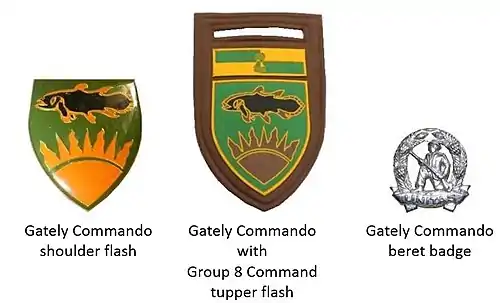| Gately Commando | |
|---|---|
 Gately Commando emblem | |
| Country | |
| Allegiance | |
| Branch | |
| Type | Infantry |
| Role | Light Infantry |
| Size | One Battalion |
| Part of | South African Infantry Corps Army Territorial Reserve, Group 8 |
| Garrison/HQ | Gately Suburb East London, South Africa |
Gately Commando was a light infantry regiment of the South African Army. It formed part of the South African Army Infantry Formation as well as the South African Territorial Reserve.
History
Origin
This commando was established in East London on 29 February 1984. Its headquarters was situated in Cately street.
Operations
With the SADF
During this era, the unit was mainly used for area force protection, search and cordones as well as stock theft control assistance to the local police.
The unit resorted under the command of Group 8.
With the SANDF
Amalgamation and final Disbandment
The unit was later disbanded and its personnel were amalgamated with the East London Commando.
Eventually this new unit, along with all other Commando units was disbanded after a decision by South African President Thabo Mbeki to disband all Commando Units.[1][2] The Commando system was phased out between 2003 and 2008 "because of the role it played in the apartheid era", according to the Minister of Safety and Security Charles Nqakula.[3]
Unit Insignia

Leadership
| From | Honorary Colonels | To |
| From | Commanding Officer | To |
| From | Regimental Sergeant Major | To |
References
- ↑ Col L B van Stade, Senior Staff Officer Rationalisation, SANDF (1997). "Rationalisation in the SANDF: The Next Challenge". Institute for Security Studies. Archived from the original on 16 March 2016. Retrieved 5 March 2015.
{{cite web}}: CS1 maint: multiple names: authors list (link) - ↑ "About the Commando system". Archived from the original on 6 December 2007. Retrieved 17 January 2008.
- ↑ de Lange, Deon. "South Africa: Commandos Were 'Hostile to New SA'". Cape Argus. Retrieved 5 March 2015.
See also
South African Commandos | |
|---|---|
| Group 1 (HQ Kelvin) | |
| Group 2 (HQ Oudtshoorn) |
|
| Group 3 (collapsed into other groups) | |
| Group 4 (collapsed into other groups) | |
| Group 5 (collapsed into other groups) | |
| Group 6 (HQ Port Elizabeth) | |
| Group 7 (HQ Grahamstown) |
|
| Group 8 (HQ East London) | |
| Group 9 (HQ Pietermaritzburg) |
|
| Group 10 (HQ Montclair, Durban) | |
| Group 11 (HQ Dundee) | |
| Group 12 (HQ Ermelo) | |
| Group 13 (collapsed into other groups) | |
| Group 14 (HQ Pietersburg) |
|
| Group 15 (HQ Thaba Tshwane) | |
| Group 16 (HQ Marievale) |
|
| Group 17 (HQ Midvaal) | |
| Group 18 (HQ Doornkop) | |
| Group 19 (collapsed into other groups) | |
| Group 20 (HQ Mmabatho) | |
| Group 21 (collapsed into other groups) | |
| Group 22 (HQ Diskobolos) | |
| Group 23 (HQ Upington) |
|
| Group 24 (HQ Kroonstad) | |
| Group 25 (HQ Bethlehem) | |
| Group 26 (HQ, Jacobsdal) | |
| Group 27 (HQ Eshowe) | |
| Group 28 (collapsed into other groups) | |
| Group 29 (collapsed into other groups) | |
| Group 30 (HQ Potchefstroom) | |
| Group 31 (HQ Wellington) | |
| Group 32 (HQ Graaff-Reinet) | |
| Group 33 (HQ Nelspruit) | |
| Group 34 (HQ Welkom) | |
| Group 35 (HQ Bloemfontein) | |
| Group 36 (HQ Tempe/Ladybrand) |
|
| Group 39 (HQ Queenstown) | |
| Group 40 (HQ Wingsfield) | |
| Group 41 (HQ Primrose) | |
| Group 42 (HQ Lenz) |
|
| Group 46 (HQ Umtata) |
|
| Walvis Bay Military Area | |
South African Army Units | |||||||||||||||||||||||||||||
|---|---|---|---|---|---|---|---|---|---|---|---|---|---|---|---|---|---|---|---|---|---|---|---|---|---|---|---|---|---|
| |||||||||||||||||||||||||||||
| |||||||||||||||||||||||||||||
| |||||||||||||||||||||||||||||
| |||||||||||||||||||||||||||||
| |||||||||||||||||||||||||||||
| |||||||||||||||||||||||||||||
| |||||||||||||||||||||||||||||
| |||||||||||||||||||||||||||||
| |||||||||||||||||||||||||||||
| |||||||||||||||||||||||||||||
| |||||||||||||||||||||||||||||
| |||||||||||||||||||||||||||||
| |||||||||||||||||||||||||||||
| |||||||||||||||||||||||||||||
| |||||||||||||||||||||||||||||
| |||||||||||||||||||||||||||||
| |||||||||||||||||||||||||||||